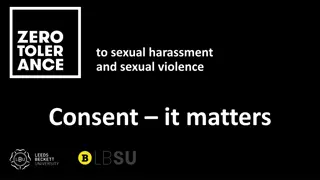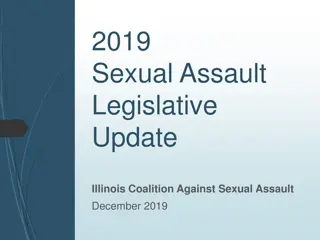Understanding Sexual Assault Perpetrators: Dynamics, Behaviors, and Strategies
Explore the manipulative and opportunistic behaviors of sexual assault perpetrators, who prey on vulnerable victims and use power dynamics to assert control. Uncover common myths and stereotypes about perpetrators, and delve into investigative strategies to identify and address their actions effectively.
Download Presentation

Please find below an Image/Link to download the presentation.
The content on the website is provided AS IS for your information and personal use only. It may not be sold, licensed, or shared on other websites without obtaining consent from the author. Download presentation by click this link. If you encounter any issues during the download, it is possible that the publisher has removed the file from their server.
E N D
Presentation Transcript
PERPETRATOR PERPETRATOR REALITIES AND REALITIES AND INVESTIGATIVE INVESTIGATIVE STRATEGIES STRATEGIES
Objectives Participants will be able to: Identify common perpetrator dynamics and behaviors. Discuss perpetrator-focused investigative strategies. Identify rapport and trust building techniques to obtain more information from perpetrators.
Stereotypes / Myths Prevail Stereotypes/myths: Sexual assault perpetrators are creepy, violent strangers jumping out of the bushes (or old van) at night. Stereotypes / myths: Are driven and reinforced by social media and news reports. Stereotypes / myths: Creates a false sense of security, because then we believe we can avoid the circumstances under which sexual assault happens (to other people).
Understanding Sexual Assault Perpetrators Many perpetrators are: Are manipulative, strategic, calculating, and opportunistic Prey on victims perceived as vulnerable, and use strategies to increase vulnerability Know their victims Are often repeat perpetrators with a series of and/or multiple victims Most often use only the amount of violence necessary to subdue/coerce/intimidate/threaten the victim Frequently have a history of or engage in other violent crimes
Understanding Sexual Assault Perpetrators Perpetrators who raped a known partner or acquaintance are also likely to have raped a stranger 2016 study, 33.3% of perpetrators Domestic violence perpetrators use sexual assault as a tool of power and control CDC - 18.3% of women and 8.2% of men experienced sexual assault by an intimate partner
Understanding Sexual Assault Perpetrators Perpetrators tend to: Feel entitled to sex Seek and use power and control Believe men and women are unequal Believe that masculinity is defined by having sex with many women Believe that aggression and dominance are tied to masculinity Believe in rigid gender roles
Understanding Sexual Assault Perpetrators Perpetrators target individuals who are or who they can make: Vulnerable Vulnerability factors can include age, disability, addiction, power dynamics, forms of "isolation" and credibility Accessible How available the victim is to the perpetrator and how difficult it is for the perpetrator to isolate them Perceived as less credible Marginalized populations, addiction disorders, mental disorders, lifestyle choices, use of drugs or alcohol
Understanding Sexual Assault Perpetrators Target individuals they perceive as already vulnerable and less likely to be believed by society: family, friends, law enforcement, prosecutors, judges, juries Physical or mental disabilities Mental health issues Engage in sex work Under the influence of drugs or alcohol Marginalized populations Use tactics to increase victim vulnerability and reduce victim credibility
Perpetrator Tactics Targeting Grooming/Organizing Testing Manipulation Isolating Coercion
Case Study Give a brief overview of the facts of the case. The perpetrator portrayed himself to the victim and others (including law enforcement) as a good Samaritan or nice guy. The perpetrator victimized someone who was vulnerable due to one of the characteristics mentioned in slide 8. The perpetrator used many of the tactics in the previous slide to increase victim vulnerability. The perpetrator was found to have engaged in other violent crimes and had multiple victims.
Investigative Strategies Investigate the perpetrator, not the crime. Start your investigation looking at the victim through the perpetrator s eyes as a target. Each case is unique; do not decide this case based on your last case. Ask about context and history. Expect perpetrator to try to manipulate law enforcement.
Investigative Strategies Look for multiple victims. Talk to friends, family, peers, former partners. Other victims may come forward if arrest is publicized. This changes the case from he said/she said to he said/they said.
Investigative Strategies Pre-text phone calls Before suspect is aware of investigation Detailed plan that the victim is comfortable with and a story that will get suspect talking Victim advocate or support person present Vital to debrief May require multiple phone calls Software to enhance evidence collection, e.g. Callyo (https://callyo.com/) Prep Work: Play an example of a successful pre-text phone call. Important redact any identifying information.
Perpetrator Pre-Offense Actions Look for conspiracy, predatory actions, premeditation Look for multiple, co-occurring crimes Expose the pre-offense conduct of the perpetrator designed to: Increase the victim s vulnerability Decrease the victim s credibility Isolate the victim Many witnesses see and hear this behavior Bartender/waiter, partygoers Neighbors Friends, family of victim Friends, family of perpetrator
Perpetrator Pre-Offense Actions In cases of alcohol-facilitated sexual assault: Who was buying/providing the drinks/drugs? How much alcohol/drugs were provided? What were the intoxication levels of the victim and suspect? Surveillance videos Receipts for drug/alcohol purchases
Perpetrator Post-Offense Actions Examine the suspect s actions post-assault: What did he say to his friends? (get to them quickly) What did he put on his social network site? What did he say to the victim?
Perpetrator Characteristics Expect perpetrator to be unwilling to see their actions as rape and/or sexual assault Understanding the non-stranger sex perpetrator: May have had no prior contact with police Don t believe they did anything wrong Admit to sex say it was consensual Believe in rape myths Have hypermasculine (macho) attitudes Explained as sex gone bad a misunderstanding
Consent Perpetrators frequently use the consent defense. How you define consent, as the investigator, frames how you approach the investigation and prosecution of a sexual violence case.
What Is Consent? Take a few minutes to write down your thoughts: What do you think of when you think of the word consent? What is your definition of consent? In what non-sexual situations/circumstances do we have to give or receive consent ?
What Is Consent? YES! ? Silence ? Active enthusiastic participation? Something in between? Compliance is not consent. What behaviors are INCONSISTENT with consensual sexual intercourse?
What Is NOT consent? The following are NOT consent: Giving in because of fear Going along to avoid being hurt Giving in because of pressure Going along to gain approval or avoid reprisal Inability to provide continued consent Agreeing to one act is not blanket consent. Consent can be revoked at any point.
Consent in Intimate Relationships Consent to sexual acts at one time is not consent for those acts at a future time. Consent and lack of consent can be expressed verbally and through body language which partners are familiar with. CDC - 18.3% of women and 8.2% of men have experienced sexual assault by an intimate partner.
Suspect Interviewing Not a traditional suspect interrogation Aims to build rapport with the suspect More effective means of obtaining information from suspect Give suspect the opportunity to share their side of the story in order to ultimately hold them accountable Feign sympathy and understanding
Suspect Interviewing Shares some characteristics with trauma-informed interviewing: Active listening Listening more than you speak Listening and hearing without judgement Not interrupting Using open-ended questions Using phrases such as, Can you help me to understand ?
Suspect Interviewing Suspect interviews are based on thorough investigative groundwork. The goals of the interview can be to: Lock the suspect into a story Identify the suspect s defense strategy Corroborate the victim s statement Identify additional investigative avenues/leads Identify additional crimes Obtain admissions/concessions and/or a confession
Summary Perpetrators plan their crimes and strategize to increase victim vulnerability, accessibility, and decrease the victim s perceived credibility. Investigative strategies should focus on perpetrator actions before, during, and after the offense. How the investigator defines consent frames how to approach the investigation and prosecute a sexual violence case. Investigators should build a rapport with the suspect during the interview to gain more information.























